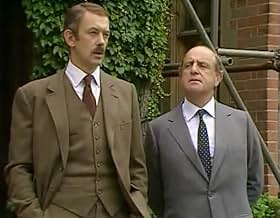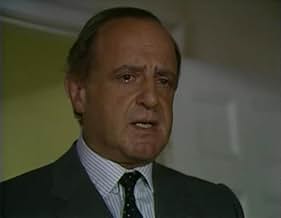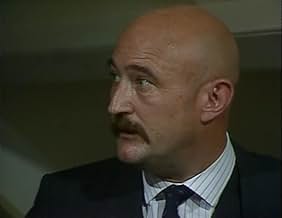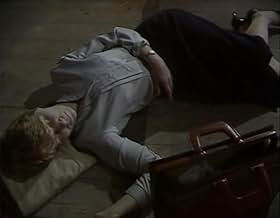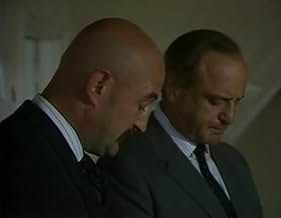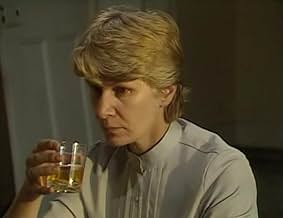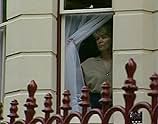Quando una studentessa di infermieristica con un'inclinazione per le piccole estorsioni viene fatalmente avvelenata durante una procedura di routine, il comandante Dalgliesh e l'ispettore Ma... Leggi tuttoQuando una studentessa di infermieristica con un'inclinazione per le piccole estorsioni viene fatalmente avvelenata durante una procedura di routine, il comandante Dalgliesh e l'ispettore Massingham devono scoprirlo.Quando una studentessa di infermieristica con un'inclinazione per le piccole estorsioni viene fatalmente avvelenata durante una procedura di routine, il comandante Dalgliesh e l'ispettore Massingham devono scoprirlo.
Sfoglia gli episodi
Recensioni in evidenza
Being 5 hrs. long, shot on "live" film stock resembling soap operas and taped plays, and having a cast of typically good British actors, a miniseries like "Shroud for a Nightingale" (SfaN) is certainly a unique and potentially very good viewing opportunity. SfaN falls far short of that potential, however.
Since adaptations of mystery novels often suffer from short running times and insufficient consideration of clues, you would think a 5-hr. miniseries format would be ideal for letting the viewer try to solve the mystery herself. Thus it's disappointing when, after investing so much time, SfaN gives up on the "fair play" solve-it-yourself aspect, choosing simply to reveal the answer in a way that no viewer could discover. (And it's not the only Dalgliesh miniseries to do this.) Strangely, SfaN goes on and on for 5 hours but never seems to think about clues any more than a 90 minute movie.
In fact, SfaN fails to maintain coherence or resolve some basic questions, even as it wastes time on redundant scenes. A character's mysterious knowledge of a victim's private financial details is treated as suspicious, then never explained. Certain innocent suspects act excessively secretive for no apparent reason. Meanwhile, events that could be conveyed in seconds are given minute upon minute of dead time. In the end, there's no reason this program should be 5 hrs. long.
One "mystery" is why sidekick Massingham, typically so accommodating to his bossy boss, suddenly spazzes out a couple of times. Goodall remarks that fellow nursing student Fallon is old compared to most students, yet Goodall looks at least 40. Weirdest of all is the scene of a drunk dancing to music from "The Godfather!" This precedes a sudden, absurd turn to bedroom farce, only enjoyable because it takes the priggish Dalgliesh down a notch.
Speaking of whom...
Lots of film fans understandably chafe at formulaic Hollywood conventions, like the insistence on making main characters "likable." However, doing the exact opposite, and having a main character who is completely unlikable, simply isn't viable for a 5-hr. miniseries. SfaN does this, and it's a serious detriment. Dalgliesh here may be the most insufferable, imperious detective protagonist I've seen. He acts like his greatest aspiration is to treat suspects as disrespectfully, even cruelly, as possible. Most of the time, my reaction was, "(insert vulgar phrase) this guy"...and to think, "Why should I spend my time with this character?"
He's associated with another series problem. Reactionary moralizing seems to surface now and then in the Dalgliesh shows I've seen. It feels just as weak and outdated as the appearance of Dalgliesh himself -- balding, mustachioed, forever in 3-piece suits and blue tie.
SfaN is not as bad as another Dalgliesh series, in which Dalgliesh went up to a sexually active bachelorette who was unconnected with the crimes, and basically blamed her promiscuity as partly responsible for what happened. Still, when one or two promiscuous people in SfaN question if Dalgliesh disapproves of their activity, he only stares at them stonily for a moment, then asks something else.
In a series that gives the soapbox to no less than three anti-abortion advocates, it would've been nice to also have at least one person stand up for a prochoice outlook. Predictably, but still annoyingly, no less than a minister persuades the pregnant woman to change her mind and not have her abortion. A holy roller proves to be a hypocritical blackmailer, but the series quickly brushes her off as an anomaly from a tiny radical sect. This time around, lesbians lose out on the sympathetic portrayal they got in "Death of an Expert Witness" -- here, they're all misandrist, crooked, and/or dirty old women.
The one challenge to this reactionary tinge is a scenario made from the blackest of irony -- a character prays for God's guidance to a good life, literally at the same time s/he unwittingly finishes his/her murderer's job with his/her own two hands. The angriest of atheists would avoid writing such a scene as too contrived!
Since adaptations of mystery novels often suffer from short running times and insufficient consideration of clues, you would think a 5-hr. miniseries format would be ideal for letting the viewer try to solve the mystery herself. Thus it's disappointing when, after investing so much time, SfaN gives up on the "fair play" solve-it-yourself aspect, choosing simply to reveal the answer in a way that no viewer could discover. (And it's not the only Dalgliesh miniseries to do this.) Strangely, SfaN goes on and on for 5 hours but never seems to think about clues any more than a 90 minute movie.
In fact, SfaN fails to maintain coherence or resolve some basic questions, even as it wastes time on redundant scenes. A character's mysterious knowledge of a victim's private financial details is treated as suspicious, then never explained. Certain innocent suspects act excessively secretive for no apparent reason. Meanwhile, events that could be conveyed in seconds are given minute upon minute of dead time. In the end, there's no reason this program should be 5 hrs. long.
One "mystery" is why sidekick Massingham, typically so accommodating to his bossy boss, suddenly spazzes out a couple of times. Goodall remarks that fellow nursing student Fallon is old compared to most students, yet Goodall looks at least 40. Weirdest of all is the scene of a drunk dancing to music from "The Godfather!" This precedes a sudden, absurd turn to bedroom farce, only enjoyable because it takes the priggish Dalgliesh down a notch.
Speaking of whom...
Lots of film fans understandably chafe at formulaic Hollywood conventions, like the insistence on making main characters "likable." However, doing the exact opposite, and having a main character who is completely unlikable, simply isn't viable for a 5-hr. miniseries. SfaN does this, and it's a serious detriment. Dalgliesh here may be the most insufferable, imperious detective protagonist I've seen. He acts like his greatest aspiration is to treat suspects as disrespectfully, even cruelly, as possible. Most of the time, my reaction was, "(insert vulgar phrase) this guy"...and to think, "Why should I spend my time with this character?"
He's associated with another series problem. Reactionary moralizing seems to surface now and then in the Dalgliesh shows I've seen. It feels just as weak and outdated as the appearance of Dalgliesh himself -- balding, mustachioed, forever in 3-piece suits and blue tie.
SfaN is not as bad as another Dalgliesh series, in which Dalgliesh went up to a sexually active bachelorette who was unconnected with the crimes, and basically blamed her promiscuity as partly responsible for what happened. Still, when one or two promiscuous people in SfaN question if Dalgliesh disapproves of their activity, he only stares at them stonily for a moment, then asks something else.
In a series that gives the soapbox to no less than three anti-abortion advocates, it would've been nice to also have at least one person stand up for a prochoice outlook. Predictably, but still annoyingly, no less than a minister persuades the pregnant woman to change her mind and not have her abortion. A holy roller proves to be a hypocritical blackmailer, but the series quickly brushes her off as an anomaly from a tiny radical sect. This time around, lesbians lose out on the sympathetic portrayal they got in "Death of an Expert Witness" -- here, they're all misandrist, crooked, and/or dirty old women.
The one challenge to this reactionary tinge is a scenario made from the blackest of irony -- a character prays for God's guidance to a good life, literally at the same time s/he unwittingly finishes his/her murderer's job with his/her own two hands. The angriest of atheists would avoid writing such a scene as too contrived!
A very interesting, varied and believable cast including numerous student nurses, their teachers and a hospital surgeon. Wonderful acting performances by the younger actresses and by the actress playing Mary Taylor. Interesting, sometimes difficult interactions between Dalgliesh and Massingham when one or both are experiencing stress, beautifully acted by both men.
The scene with Dalgliesh and the aging widow was not erotic at all but more painful and pathetic; only Dalgliesh's wish for information kept him in the room with this drunken person whose behavior was puzzling if not downright unbelievable. The Australian woman who found it erotic must be very young; it was actually an ugly scene.
A fascinating mystery, otherwise.
The scene with Dalgliesh and the aging widow was not erotic at all but more painful and pathetic; only Dalgliesh's wish for information kept him in the room with this drunken person whose behavior was puzzling if not downright unbelievable. The Australian woman who found it erotic must be very young; it was actually an ugly scene.
A fascinating mystery, otherwise.
Unfortunately this show is not readily available to the public on Video! Having seen the show on television, I must say that I thoroughly enjoyed it. It is a fairly accurate adaptation of P D James's Novel"A Shroud for a Nightingale" The cast is excellent and Roy Marsden is perfectly cast as the central hero, Adam Dalgliesh. Joss Ackland, plays the egotistical Courtney-Briggs to perfection and Sheila Allen, the seemingly aloof Matron Mary Taylor, exuding vibes of attraction for Adam.
One scene stole the show! The scene where Dalgliesh interviews a slightly drunk Delia Dettinger (Margaret Whiting) The parody of 'above and beyond the call of duty' is beautifully played by Marsden and Whiting. The result, is humour underscored by underlying erotica between the two, with only a necktie being removed! Great stuff, which only such British actors can succeed in ! If it comes to your screens in a repeat, I recommend it!
One scene stole the show! The scene where Dalgliesh interviews a slightly drunk Delia Dettinger (Margaret Whiting) The parody of 'above and beyond the call of duty' is beautifully played by Marsden and Whiting. The result, is humour underscored by underlying erotica between the two, with only a necktie being removed! Great stuff, which only such British actors can succeed in ! If it comes to your screens in a repeat, I recommend it!
Shroud for a Nightingale is definitely one of my favourite adaptations, and possibly my all time favourite book from P.D James. It translates very well from text to screen, the only real problem, it's overlong.
The first thing that will grab your attention, the names of those appearing, some of the very best, including Sheila Allen, Liz Fraser, and of course the wonderful Joss Ackland.
I absolutely love the first two episodes, the hospital makes for a great setting, you see the hospital running well, but scratch the surface and underneath we discover hidden passions, lies, blackmail and of course murder.
It does dip in the middle a little, and part four offers you virtually nothing, it's so dull, but the final episode is a really dramatic conclusion.
Tame by modern standards, but I imagine that some of the themes they dealt with were pretty controversy for a 1984 audience.
Richard Harvey's music as always is enchanting and glorious.
I loved it, 8/10.
The first thing that will grab your attention, the names of those appearing, some of the very best, including Sheila Allen, Liz Fraser, and of course the wonderful Joss Ackland.
I absolutely love the first two episodes, the hospital makes for a great setting, you see the hospital running well, but scratch the surface and underneath we discover hidden passions, lies, blackmail and of course murder.
It does dip in the middle a little, and part four offers you virtually nothing, it's so dull, but the final episode is a really dramatic conclusion.
Tame by modern standards, but I imagine that some of the themes they dealt with were pretty controversy for a 1984 audience.
Richard Harvey's music as always is enchanting and glorious.
I loved it, 8/10.
After the slow start with the 7 episode Death of an Expert Witness, the next adaptation of a P. D. James novel - the intriguingly named Shroud For a Nightingale - is reduced to 5 episodes and proves to be a compelling watch. The title refers to the names of the student nurses who reside at Nightingale House, a training school that sits in the grounds opposite the hospital where paying patients go to be treated. The shroud is, omniously enough, for one or more of the nurses who during this mystery will fall prey to a killer. But who, and why?
The story itself is originally concerned with the arrival at the hospital of Martin Dettinger (yes, that IS Richard Marner from 'Allo 'Allo), a gun runner who Dalgliesh is sent to question regarding the death of a witness in a fraud case. Many would like to see Dettinger dead, not least high up officials in government who he (unofficially) did deals for, and Dalgliesh becomes convinced that Dettinger is being framed for convenience sake. But whilst there Dettinger recognizes one of the staff from his past, but is not entirely certain where. However, while it looks as if Dettinger will be the victim, it turns out it is not him who is the first to die. That falls to student nurse Heather Pearce (Deborah Findley), who is the night nurse assigned to look after him. She is also a petty blackmailer who has already got her hooks into fellow student Christine Dakers (Natalie Ogle) after spotting her picking up money dropped by one of the other nurses. The scene where she blackmails Dakers in her room is somewhat amusing, especially the affronted tone she puts on when Dakers baulks at paying her. "No, not to me. This money is 'dirty', Christine," she says distastefully. Pearce pretends that she is doing it for Dakers' own spiritual wellbeing, but amusingly lets the facade slip when leaving. "I pray for you," she tells her, before adding "Cash." When Dalgliesh discovers Pearce is Dettinger's nurse he wants to question her, but he has to wait as Pearce is used as the human guinea pig in nasal gastric feeding training for the other nurses - yikes!. (When one nurse suggests rectal feeding I couldn't help but smile, as all I could visualise afterwards was one of the nurses desperately trying to feed a hamburger that way to an unfortunate patient they were treating). As it is, the demonstration leads to a memorable scene where Pearce is poisoned by the feed up her nose. But as Dalgliesh begins his investigations things are further complicated when he discovers that the original person due to play the patient was not Pearce, but Jo Fallon, who pulled out sick only that morning. Fallon herself has discovered she is pregnant, but parentage is not entirely certain. Was she the intended victim or Pearce? And if it was Pearce, is it because of her blackmailing or what she may of overheard during Dettinger's drug induced sleep? Or something else as yet unknown?
The first episode sets up this mystery perfectly as it establishes the lives of the student nurses and staff living there. As well as the above mentioned, there is also Sister Mavis Gearing's relationship with a married man, surgeon Stephen Courtney-Briggs' former affair with student Jo Fallon, while lesbianism appears again in P. D. James land with Sister Rolfe's infatuation with student Julia Pardoe, plus the special relationship between Matron Mary Taylor and Sister Brumfett - though that is somewhat more ambiguous. The many plot threads make fascinating viewing as we and Dalgliesh try to establish just why Pearce died and if she was the intended target. Roy Marsden is superb in this, ranging from gentle and probing to direct and brutal, and a few times he is surprisingly rude (for Dalgliesh's standards), such as when he questions Courtney-Briggs (Joss Ackland) over his relationship with Jo Fallon. Ackland is wonderful in this, with his charismatic performance and deep fruity voice. He rises to the occasion, as do a number of the actresses in this. I particularly loved the friendship Dalgliesh forms with Matron Taylor (Sheila Allen) and their well scripted conversations they have between them, and Sheila Allen makes Matron a warm and likeable character. She is also one of the few that has a well established alibi, unlike the others at Nightingale House. I also liked Andree Evans as Sister Rolfe, her misandry and contempt for men barely concealed as she more than holds her own against Dalgliesh's questionings. But she is equally touching when displaying her infatuation with Julia Pardoe (Judi Maynard) and the gradual realisation that at her age she stands little chance of a relationship with the younger (and shallow) Pardoe. Thelma Whiteley is effectively intimidating as Brumfett, but Liz Fraser as Sister Mavis Gearing is more of a Mavis Wilton from Coronation Street and as such seems a less obvious suspect to be a killer (or is she?). Fraser would give a much better performance in Miss Marple's Nemesis in 1987.
As for the students, performances range from perfunctionary to good. Of the more notable is Eleanor David, who gives an assured and intelligent performance as Jo Fallon, who discovers she is pregnant and uncertain whether to keep the child or not. She also supplies the one surprising moment of nudity in this - something I wasn't expecting! Rosalyn Elvyn carries much of the emotional baggage as Madeline Goodall, and her interrogation scenes with Dalgliesh are surprisingly uncomfortable, with Dalgliesh remarkably hard on her. The aptly named Natalie Ogle is sweet as Christine Dakers, but apart from Lynne Pearson as Diane Harper (who departs after two episodes) the acting could be a little sharper among the students. As could some of the dialogue early on, which is a little bit clunky. There is one scene where Dakers collapses after scalding herself. As the others race in, Sarah Thomas (of Last of the Summer Wine fame) declares "She's scalded herself," while Marcia Tucker cries out "It's her leg!" Talk about stating the bleeding obvious, and Tucker must of been cursing her luck being lumbered with such dialogue. And speaking of sitcom stars, this also contains Allo Allo's Richard Marner, who is surprisingly good as Dettinger, while Only Fools & Horses stars Lennard Pearce and Buster Merryfield also appear. While Merryfield is rather too clipped and mannered as the pathologist Miles Honeyman, Pearce is much more convincing with his whisky voice as the gate keeper Mr Coles in what was his last role before he died.
As it is, it tells the strength of this production that it is able to rise above such minor irritations to become a hugely compelling mystery. It is full of memorable moments, such as the stormy night in episode 2 that leads to a 2nd murder, plus the fire in the summerhouse in the climatic final episode. Even the interrogation scenes are hypnotic, and the eventual revelation proves to have a huge emotional impact that makes Shroud for a Nightingale one of P. D. James' best adaptations. I am torn between this and Taste For Death as the best in the series, but this certain ranks as one of the most rewarding.
The story itself is originally concerned with the arrival at the hospital of Martin Dettinger (yes, that IS Richard Marner from 'Allo 'Allo), a gun runner who Dalgliesh is sent to question regarding the death of a witness in a fraud case. Many would like to see Dettinger dead, not least high up officials in government who he (unofficially) did deals for, and Dalgliesh becomes convinced that Dettinger is being framed for convenience sake. But whilst there Dettinger recognizes one of the staff from his past, but is not entirely certain where. However, while it looks as if Dettinger will be the victim, it turns out it is not him who is the first to die. That falls to student nurse Heather Pearce (Deborah Findley), who is the night nurse assigned to look after him. She is also a petty blackmailer who has already got her hooks into fellow student Christine Dakers (Natalie Ogle) after spotting her picking up money dropped by one of the other nurses. The scene where she blackmails Dakers in her room is somewhat amusing, especially the affronted tone she puts on when Dakers baulks at paying her. "No, not to me. This money is 'dirty', Christine," she says distastefully. Pearce pretends that she is doing it for Dakers' own spiritual wellbeing, but amusingly lets the facade slip when leaving. "I pray for you," she tells her, before adding "Cash." When Dalgliesh discovers Pearce is Dettinger's nurse he wants to question her, but he has to wait as Pearce is used as the human guinea pig in nasal gastric feeding training for the other nurses - yikes!. (When one nurse suggests rectal feeding I couldn't help but smile, as all I could visualise afterwards was one of the nurses desperately trying to feed a hamburger that way to an unfortunate patient they were treating). As it is, the demonstration leads to a memorable scene where Pearce is poisoned by the feed up her nose. But as Dalgliesh begins his investigations things are further complicated when he discovers that the original person due to play the patient was not Pearce, but Jo Fallon, who pulled out sick only that morning. Fallon herself has discovered she is pregnant, but parentage is not entirely certain. Was she the intended victim or Pearce? And if it was Pearce, is it because of her blackmailing or what she may of overheard during Dettinger's drug induced sleep? Or something else as yet unknown?
The first episode sets up this mystery perfectly as it establishes the lives of the student nurses and staff living there. As well as the above mentioned, there is also Sister Mavis Gearing's relationship with a married man, surgeon Stephen Courtney-Briggs' former affair with student Jo Fallon, while lesbianism appears again in P. D. James land with Sister Rolfe's infatuation with student Julia Pardoe, plus the special relationship between Matron Mary Taylor and Sister Brumfett - though that is somewhat more ambiguous. The many plot threads make fascinating viewing as we and Dalgliesh try to establish just why Pearce died and if she was the intended target. Roy Marsden is superb in this, ranging from gentle and probing to direct and brutal, and a few times he is surprisingly rude (for Dalgliesh's standards), such as when he questions Courtney-Briggs (Joss Ackland) over his relationship with Jo Fallon. Ackland is wonderful in this, with his charismatic performance and deep fruity voice. He rises to the occasion, as do a number of the actresses in this. I particularly loved the friendship Dalgliesh forms with Matron Taylor (Sheila Allen) and their well scripted conversations they have between them, and Sheila Allen makes Matron a warm and likeable character. She is also one of the few that has a well established alibi, unlike the others at Nightingale House. I also liked Andree Evans as Sister Rolfe, her misandry and contempt for men barely concealed as she more than holds her own against Dalgliesh's questionings. But she is equally touching when displaying her infatuation with Julia Pardoe (Judi Maynard) and the gradual realisation that at her age she stands little chance of a relationship with the younger (and shallow) Pardoe. Thelma Whiteley is effectively intimidating as Brumfett, but Liz Fraser as Sister Mavis Gearing is more of a Mavis Wilton from Coronation Street and as such seems a less obvious suspect to be a killer (or is she?). Fraser would give a much better performance in Miss Marple's Nemesis in 1987.
As for the students, performances range from perfunctionary to good. Of the more notable is Eleanor David, who gives an assured and intelligent performance as Jo Fallon, who discovers she is pregnant and uncertain whether to keep the child or not. She also supplies the one surprising moment of nudity in this - something I wasn't expecting! Rosalyn Elvyn carries much of the emotional baggage as Madeline Goodall, and her interrogation scenes with Dalgliesh are surprisingly uncomfortable, with Dalgliesh remarkably hard on her. The aptly named Natalie Ogle is sweet as Christine Dakers, but apart from Lynne Pearson as Diane Harper (who departs after two episodes) the acting could be a little sharper among the students. As could some of the dialogue early on, which is a little bit clunky. There is one scene where Dakers collapses after scalding herself. As the others race in, Sarah Thomas (of Last of the Summer Wine fame) declares "She's scalded herself," while Marcia Tucker cries out "It's her leg!" Talk about stating the bleeding obvious, and Tucker must of been cursing her luck being lumbered with such dialogue. And speaking of sitcom stars, this also contains Allo Allo's Richard Marner, who is surprisingly good as Dettinger, while Only Fools & Horses stars Lennard Pearce and Buster Merryfield also appear. While Merryfield is rather too clipped and mannered as the pathologist Miles Honeyman, Pearce is much more convincing with his whisky voice as the gate keeper Mr Coles in what was his last role before he died.
As it is, it tells the strength of this production that it is able to rise above such minor irritations to become a hugely compelling mystery. It is full of memorable moments, such as the stormy night in episode 2 that leads to a 2nd murder, plus the fire in the summerhouse in the climatic final episode. Even the interrogation scenes are hypnotic, and the eventual revelation proves to have a huge emotional impact that makes Shroud for a Nightingale one of P. D. James' best adaptations. I am torn between this and Taste For Death as the best in the series, but this certain ranks as one of the most rewarding.
Lo sapevi?
- QuizThe security guard at the hospital is played by Lennard Pearce who played "Grandad" in Only Fools and Horses. When he died suddenly in 1984 he was replaced on the sitcom by Buster Merryfield who also features in this series as pathologist Sir Miles Honeyman.
- BlooperDuring the opening credits, it states 'Dramatized by' This is a British production and more correctly should have stated 'Dramatised by' The spelling 'Dramatized' is American English.
- ConnessioniFollowed by Cover Her Face (1985)
I più visti
Accedi per valutare e creare un elenco di titoli salvati per ottenere consigli personalizzati
Dettagli
- Data di uscita
- Paese di origine
- Lingua
- Celebre anche come
- Mens englene sover
- Azienda produttrice
- Vedi altri crediti dell’azienda su IMDbPro
Contribuisci a questa pagina
Suggerisci una modifica o aggiungi i contenuti mancanti


